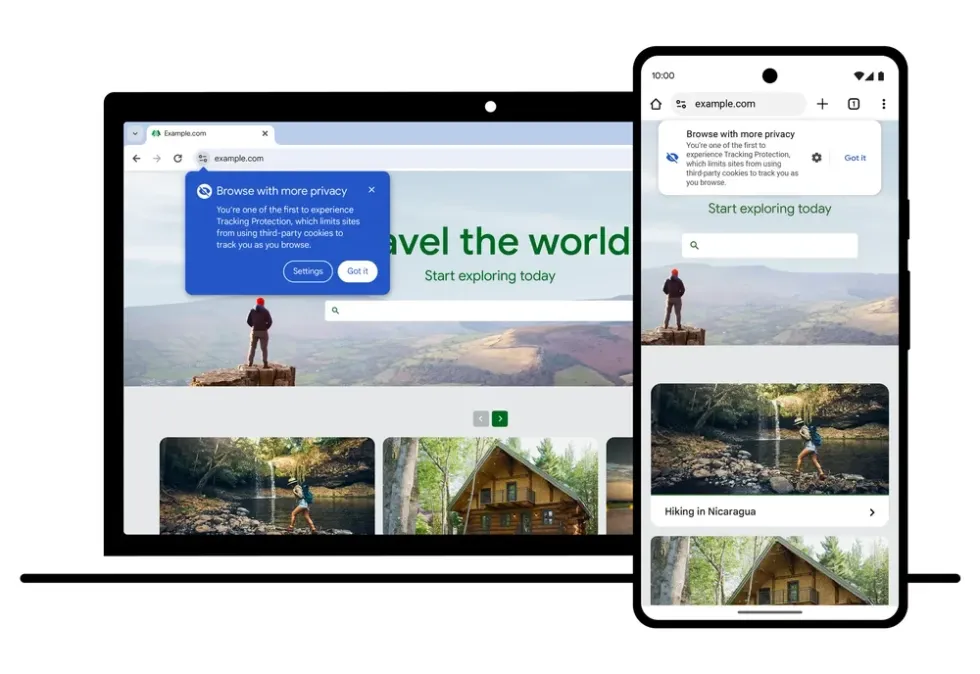Google Chrome is the most popular web browser on the planet, with over 3 billion users
GETTY IMAGES
Advertising cookies will remain for the foreseeable future
- Google announced plans to block cookies back in 2019
- But after five years of work, the project has been ditched
- UK's Competition and Markets Authority had voiced concerns
- Safari, built by Californian rival Apple, blocked cookies in 2020
Don't Miss
Most Read
Trending on GB News
Google will abandon a major overhaul to its Chrome web browser — the most popular way to access the internet on the planet — five years after it first announced plans. The Californian company hoped to strip third-party advertising cookies from Google Chrome in a bid to improve online privacy.
Even if you're unfamiliar with the term "cookie, " you'll have come across these minuscule text files stored in your browser so online services can remember who you are. If you return to an online store and find that you're still got some items in your basket from an earlier visit — that's only possible because of cookies.
They're also the reason that you'll be confronted with a pop-up warning that a website uses cookies whenever you visit for the first time — an initiative passed by the European Union when the UK was still a member state.
Google launched its Privacy Sandbox initiative in 2019 to find a way to remove third-party cookies used for advertising within its browser. These text snippets are used to track activity across multiple websites to learn your habits and interests to better target you with adverts for new products, holidays, or services.
However, after five years of hunting for a solution, Anthony Chavez, Vice President of Google's Privacy Sandbox, published a blog post this week stating that while the scheme’s work had shown signs of success, it also required "significant work by many participants and will have an impact on publishers, advertisers and everyone involved in online advertising."
The move was controversial from the moment that it was announced. Digital advertisers complained the Privacy Sandbox initiative would destroy their business models and all but guarantee that companies looking to advertise would need to pay Google for its consumer data to target their ad campaigns.
Google will now shift to an opt-in system that "elevates user choice," Mr Chavez said.
"Instead of deprecating third-party cookies, we would introduce a new experience in Chrome that lets people make an informed choice that applies across their web browsing, and they’d be able to adjust that choice at any time,” he said. “We’re discussing this new path with regulators, and will engage with the industry as we roll this out.”
Google has worked particularly closely with regulators in the UK on the scheme, including the Competition and Markets Authority (CMA) and the Information Commissioner’s Office (ICO).
In response to Google’s announcement about its change of approach, a spokesperson for the CMA said: "We intervened and put in place commitments in 2022 because of concerns that Google’s Privacy Sandbox proposals could distort competition by causing advertising spend to become even more concentrated on Google’s ecosystem at the expense of its competitors.
"We will need to carefully consider Google’s new approach to Privacy Sandbox, working closely with the ICO in this regard, and welcome views on Google’s revised approach – including possible implications for consumers and market outcomes."

An early image released by the Privacy Sandbox team showing pop-ups that would appear to alert users when third-party cookies had been blocked
GOOGLE PRESS OFFICE
Stephen Bonner, deputy commissioner at the ICO said: "We are disappointed that Google has changed its plans and no longer intends to deprecate third-party cookies from the Chrome Browser. From the start of Google’s Sandbox project in 2019, it has been our view that blocking third-party cookies would be a positive step for consumers.
LATEST DEVELOPMENTS
- Is there a Government Edition of Windows 11 with no tracking?
- Mid-contract broadband price rises OUTLAWED by Ofcom
- Best VPN deals
- Best Sky Stream deals
- Crucial deadline from Sony hints at PS5 Pro release date
"The new plan set out by Google is a significant change and we will reflect on this new course of action when more detail is available. Our ambition to support the creation of a more privacy-friendly internet continues. Despite Google’s decision, we continue to encourage the digital advertising industry to move to more private alternatives to third-party cookies – and not to resort to more opaque forms of tracking.
"We will monitor how the industry responds and consider regulatory action where systemic non-compliance is identified for all companies including Google."
Apple has blocked cookies on its own web browser to prevent advertisers from snooping on your browsing history to target adverts since March 2020. By default, using Safari will ensure no advertiser or website is able to follow you around the internet using these commonplace text files.
Additional Reporting By Martyn Landi, PA Technology Correspondent








